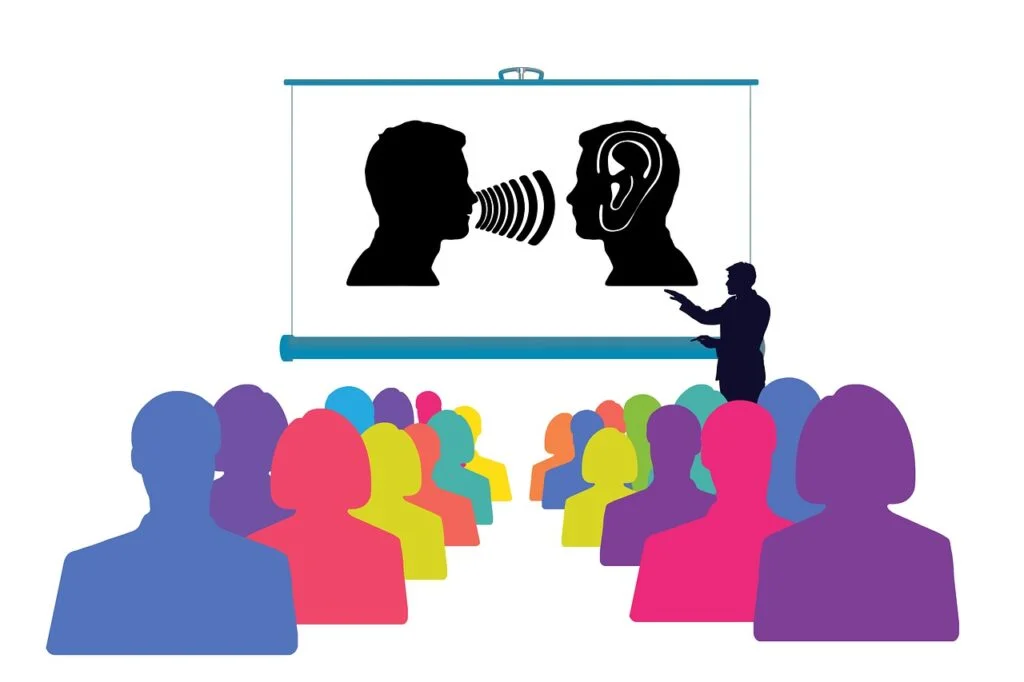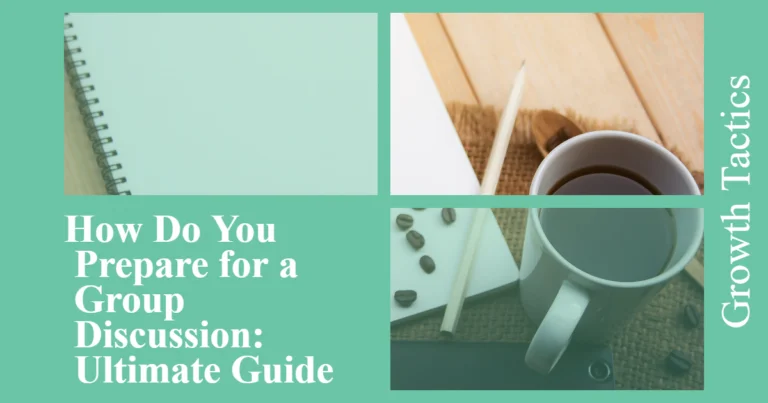Group discussions are a crucial part of many interview processes and evaluation procedures. In a group discussion, a group of candidates come together to discuss a particular topic, while evaluators observe them. Group discussions allow evaluators to gauge many important skills like communication, listening, leadership, teamwork, and critical thinking.
According to a survey by Yale University, over 85% of employers said they prioritize hiring candidates who demonstrate strong communication and interpersonal skills. This highlights the importance of preparing for and performing well in group discussions.
Jump To Section
What is a Group Discussion?

A group discussion (GD) is a process where a group of people come together to discuss a particular topic. It is a common assessment method used during interviews and other settings to evaluate various skills like communication, teamwork, leadership, problem-solving, and more.
Some common formats for group discussions include:
- Round table discussion – Candidates sit facing each other and discuss a topic. A facilitator may be present.
- Panel discussion – Candidates sit facing interviewers who pose questions. Candidates take turns answering.
- Fishbowl format – Some candidates sit facing each other and discuss while others observe. Roles are rotated.
The purpose of a GD is to assess how well candidates can express their thoughts, listen to others, maintain discussion flow, show teamwork, and handle interpersonal dynamics. It allows interviewers to gauge skills beyond academic performance. Performance in a GD is often a vital factor in the selection of jobs or academic programs.
Why Are Group Discussions Important?
Group discussions are an important part of many interview processes and assessment centers. They allow potential employers to evaluate several key skills and qualities in candidates, including:
A group discussion assesses how well you can communicate ideas, opinions, and arguments in a clear and persuasive way. Employers want team members who can put forward their viewpoints coherently while also listening to others. Your verbal communication skills are on display in terms of vocabulary, style, tone, and ability to get your point across.
Teamwork Ability
In a group discussion, employers can observe how you interact with peers and evaluate your teamwork potential. They will look for signs that you can collaborate productively, allow space for others, synthesize different viewpoints, and maintain a positive attitude. Group discussions demonstrate that you can work well with diverse personalities.
Critical Thinking
The group discussion format enables evaluators to gauge their critical thinking, problem-solving, and quick decision-making abilities. They want to see how you analyze information, articulate logical arguments, and provide solutions to complex issues. Your thought process and judgment skills are revealed through the positions you take and the contributions you make during the discussion.
In summary, group discussions test soft skills like communication, collaboration, and cognitive abilities in an interactive setting. Standing out requires not just subject knowledge but also social intelligence and analytical thinking. Preparing adequately can help you successfully showcase these competencies.
How to Prepare for a Group Discussion

Preparing thoroughly is crucial for succeeding in group discussions. Here are some key ways to get ready:
- Research common GD topics: Look into current affairs, news, and issues that are frequently discussed. Read up on topics you are less familiar with. This will give you the knowledge to draw from during the discussion.
- Practice public speaking: Set aside time to practice speaking aloud on various topics. Get comfortable expressing your thoughts and opinions out loud. You can even record yourself to review. This will boost your confidence for the real group discussion.
- Work on discussion skills: Practice initiating a discussion, steering it back on track, and concluding. Make eye contact when others speak. Nod to show you are listening. Learn to summarize key points. Mastering these skills will ensure you can actively participate.
The more you practice these areas, the more comfortable and effective you will be in expressing yourself during the high-pressure group discussion. Preparing thoroughly takes time but gives you the best chance to shine.
GD Discussion Skills To Focus On
To succeed in group discussions, you need to demonstrate key skills like verbal communication, body language, active listening, and teamwork.
Verbal Communication
How you communicate verbally in a group discussion is critical. You need to express your thoughts and opinions clearly and concisely. Speak loud enough to be heard by the entire group while maintaining a pleasant tone. Avoid rambling or dominating the conversation. Make sure your points relate directly to the topic at hand. Practice speaking slowly and articulately.
Body Language/Non-Verbals
Your body language conveys just as much as your words. Maintain an open posture by uncrossing your arms and legs. Lean slightly forward to show engagement. Make steady eye contact with other participants and the facilitator as you speak. Nod periodically to indicate active listening. Avoid nervous gestures like fidgeting or tapping your foot. Ensure your facial expressions align with the tone of the discussion.
Active Listening
Listening actively demonstrates respect for others’ perspectives. Face the speaker, maintain eye contact, and avoid distractions. Nod and use affirming words like “I see” to show you are engaged. Take notes on key points. Then thoughtfully summarize others’ arguments before responding. Ask questions to clarify or expand on ideas.
Teamwork
A group discussion is a team effort, not a competition. Acknowledge and validate insightful points made by others. Build on the ideas mentioned to find common ground. If you disagree, do so politely. Compromise when appropriate to reach a consensus. Keep the discussion productive by steering it back on track if needed.
How To Initiate the Discussion
Initiating the discussion is an important first step that can set the tone for the rest of the group discussion. Have an opening statement prepared to introduce yourself, refer to the topic at hand, and pose an initial question to get the conversation started.
For example, you could say:
“Hello everyone. Today our topic is [insert topic here]. To start, I think it would be helpful to get a sense of each person’s general thoughts on this issue. Does anyone have any initial reactions or opinions to share?”
This opening statement introduces you, reminds the group of the topic, and prompts others to begin sharing their thoughts. Posing an open-ended question encourages multiple people to speak up right away.
Other good opening questions could be:
- What do you see as the key aspects or factors to consider here?
- Are there some pros and cons of this issue?
- What are your initial thoughts on the best approach?
The goal is to initiate substantive dialogue by getting people engaged with the topic. You want to demonstrate confidence, set a collaborative tone, and steer the group toward a productive discussion from the very start. With practice, you can master how to effectively kick off the conversation.
Steering the Group Discussion
Steering the group discussion is an important skill for ensuring an effective and collaborative conversation. As a participant, you want to keep the discussion on track, make smooth transitions between speakers and topics, and involve all members.
To keep the discussion on track, listen closely to what others are saying. If the conversation starts to go off on tangents, politely guide it back to the main topic. You can say something like “That’s an interesting point, but let’s get back to discussing…” Use summarizing and transition statements like “Building off of what John said…” to connect ideas and move the discussion forward.
Making smooth transitions between speakers prevents any awkward pauses or moments of confusion. After someone finishes speaking, quickly affirm their point and call on another person, or pose a new question to the group. You want to keep things flowing naturally. Pay attention to group dynamics and invite quieter members to speak up if needed.
Involving all members is key. Don’t let 1or 2 people dominate the conversation. Make eye contact and actively listen when others speak. Ask for input from those who haven’t shared much yet. If you notice someone trying to interrupt another speaker, gently remind them to wait their turn. Keeping things civil and giving everyone a chance to contribute will lead to a productive discussion.
Presenting Your Viewpoint
When presenting your viewpoint in a group discussion, it’s important to support your opinions with logic and facts. Simply stating your views without backing them up can undermine your credibility. Come prepared with strong arguments and specific examples to reinforce your perspective.
Keep your responses clear and concise. Rambling or speaking for too long can bore others and prevent more voices from being heard. Make your point, provide evidence, and then allow others to share. If needed, offer follow-up thoughts later on.
Remember to always bring the discussion back to the central topic. It’s easy to get sidetracked in group conversations. If you feel things going off course, politely guide things back by saying something like “That’s an interesting point, but let’s get back to talking about…” and re-stating the core issue or question.
Staying focused, structured, and factual when presenting your viewpoint will ensure you come across as knowledgeable and help facilitate an effective group discussion.
Listening to Others

Listening is a critical skill for effective group discussions. When others are speaking, give them your full attention. Make eye contact, nod occasionally, and avoid distracting mannerisms.
Ask clarifying questions if you need more context or don’t fully understand someone’s viewpoint. By asking thoughtful questions, you show that you are engaged and interested in what they have to say.
It’s also helpful to paraphrase or summarize key points made by other participants. This demonstrates that you comprehended their arguments and perspectives. Summarizing shows that you are an active listener invested in a thoughtful discussion.
However, be careful not to interrupt or talk over people. Wait for an appropriate opening to add your thoughts. The goal is to have a free exchange of ideas, not a competition to see who can talk the most.
With good listening skills, you can build on others’ comments to take the discussion in a productive direction. This creates a collaborative environment where everyone feels heard.
Conclusion
In summary, being well-prepared is crucial for success in group discussions. Throughout this article, we covered the key strategies to keep in mind:
- Research the topic thoroughly to have an informed perspective to share
- Plan 2-3 relevant points to contribute, with examples to back up your opinions
- Practice outlining your thoughts concisely and coherently
- Work on your non-verbal communication by maintaining eye contact, nodding, and using positive body language
- Listen attentively when others speak and build on their perspectives
- Steer the discussion by bringing it back on track if needed
With the right preparation and practice, you can master the group discussion format. The key is being confident in your subject knowledge while remaining flexible and engaging with your fellow participants. If you incorporate these tips, you’ll be equipped to impress in your next GD round.
The best way to improve is to seek out opportunities to practice group discussion skills. Look into joining a public speaking or debate club if available. The more experience you gain participating in group discussions, the more natural it will become over time. With an open mindset and dedication to developing your communication abilities, you can succeed in this crucial part of the interview process.


